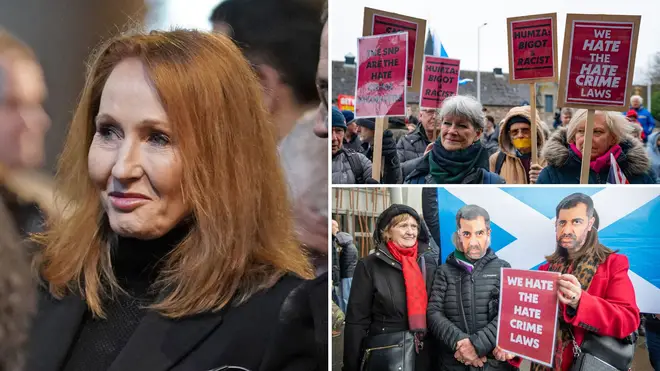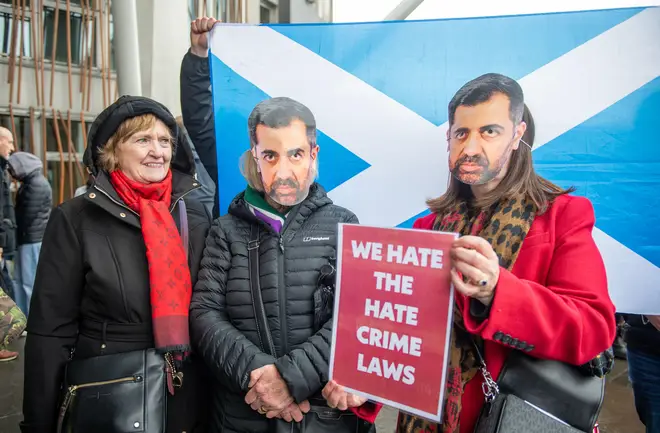
Nick Ferrari 7am - 10am
1 April 2024, 14:28 | Updated: 1 April 2024, 23:14

JK Rowling has said she is 'looking forward to being arrested' over the Scottish hate crime law that came into effect on Monday.
Hundreds of protesters echoed the author's comments as they gathered outside Scotland's Parliament to demonstrate against the legislation, with some saying they are "prepared to be jailed".
Ms Rowling, who has been an outspoken critic of some elements of the transgender rights movement, said earlier Monday the new law was "wide open to abuse by activists".
In a social media post, the Harry Potter creator, who is Scottish, argued: "It is impossible to accurately describe or tackle the reality of violence and sexual violence committed against women and girls, or address the current assault on women's and girls' rights, unless we are allowed to call a man a man."
Criticising the new laws, she insisted that the "legislation is wide open to abuse by activists who wish to silence those of us speaking out about the dangers of eliminating women's and girls' single-sex spaces".
Rowling added: "I'm currently out of the country, but if what I've written here qualifies as an offence under the terms of the new act, I look forward to being arrested when I return to the birthplace of the Scottish Enlightenment."

Around 300 people protested outside the Scottish Parliament to oppose new hate crime legislation on Monday.
A coffin bearing a sign reading "We hate hate crime laws" was decorated with masks resembling SNP leader Humza Yousaf and co-leader of the Scottish Greens, Patrick Harvie.
The Hate Crime and Public Order (Scotland) Act was described as "totalitarian" and "ammunition for bigots" amid concerns of tit-for-tat reports, with one man taping his mouth closed to show his opposition.
Placards read "Truth is not hate speech", and "Protect free speech".
The Hate Crime and Public Order (Scotland) Act came into force overnight having been passed by MSPs in 2021, consolidating existing legislation and creating a new offence of stirring up hatred against protected characteristics like age, disability, sexual orientation and transgender identity.
However, women have not been given protection under the law, with the Scottish Government instead promising to bring forward legislation to tackle misogyny.
But Scotland's First Minister Humza Yousaf said he was "very proud" of the new laws, saying they will help protect against a "rising tide" of hatred.
The First Minister also insisted he is "very confident in Police Scotland's ability in order to implement this legislation in the way it should".

Speaking about the new legislation, Mr Yousaf added: "Let's remember of course that when it comes to stirring up offences of racial hatred, stirring up offences have existed since 1986, being policed with virtually no controversy whatsoever."
Gathering at the protest Monday, Mark Leslie, an artist, said: "People tend to think that if you are against this you want to be abusive. I'm not political, I'm not religious, but I think this law is ammunition for bigots. It's freaky that records can be stored but they can't even get crime done.
"The reason I'm here is the Scottish Enlightenment - the church and state should have no power over what people are allowed to say. This is the opposite of the Scottish Enlightenment."
Sally Wainwright, 70, from Scottish Lesbians, said she knew younger women who were afraid of losing their jobs because of having posted on social media about their desire to maintain female-only spaces.
Ms Wainwright said: "I'm a lesbian and I'm really concerned that our voices are never heard - this act will make it more difficult for us to speak. It completely interferes with freedom of speech.
Nick Mitchell, 31, from Edinburgh, said he was prepared to face trial for his opposition to the new law, and had been studying European Convention on Human Rights legislation, specifically Article 10, to challenge it in court if necessary despite the prospect of a seven-year prison sentence.
He carried a sign which read "I control my tongue not the Government nor the police, my freedom of speech is my human right I will not be silent", and described Scotland as "totalitarian" and "a dictatorship".
Mr Mitchell said: "I'm against every aspect of it, there's no need for it. I'm not a racist or a transphobe but I call a spade a spade, and I'm prepared to go to jail for it. I've got contingency plans. I'll go to court in front of a jury for my human rights.

Elon Musk and podcaster Joe Rogan, both based in the US, have criticised the new legislation.
Billionaire entrepreneur Mr Musk suggested the laws were misguided as he shared a post on X which claimed comedians would be targeted, writing: "An example of why it is so important to preserve free speech".
And US podcast host Joe Rogan said during a recent episode: "You see that wild s*** in Scotland where they are targeting comedians with hate crime laws?... Jesus Christ Scotland, you have one of the biggest comedy festivals on earth... this is just ridiculous.
"Every generation either goes too far to the left or too far to the right - so these f****** have decided to target people and put them in jail."
When asked by LBC how he would respond to Elon Musk and Joe Rogan’s comments, Humza Yousaf said: "They are right-wing actors of course and I think it's very clear, from particularly someone like Joe Rogan, that there's never going to be sympathy for the fact we are bringing in legislation that is clamping down on hatred.
"So I'm not surprised by his criticisms necessarily. What I would say is the threshold of criminality in terms of the new offences is very, very high indeed. Your behaviour has to be threatening or abusive and intended to stir up hatred.
"And I've asked this question of many people who've opposed the act: 'Can they give me an example of behaviour that is threatening or abusive and intends to stir up hatred that they don't think should be prosecuted?' And no answer comes.
"So the thresholds are very high, freedom of expression protections are embedded within the bill and of course police have clarified they're not going to be targeting comedians or playwrights as has been suggested by some who spread disinformation.
"I'm very confident we've got a robust piece of legislation that will protect people against the riding tide of hatred we see right across the world."